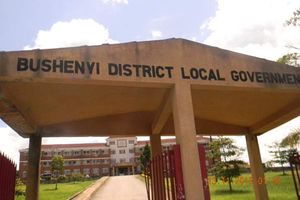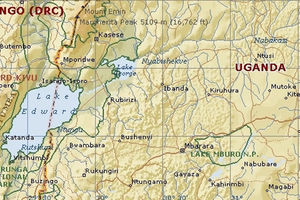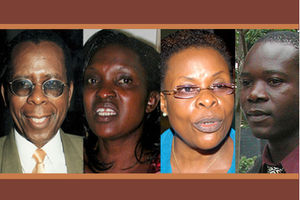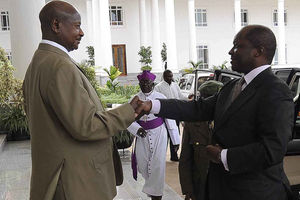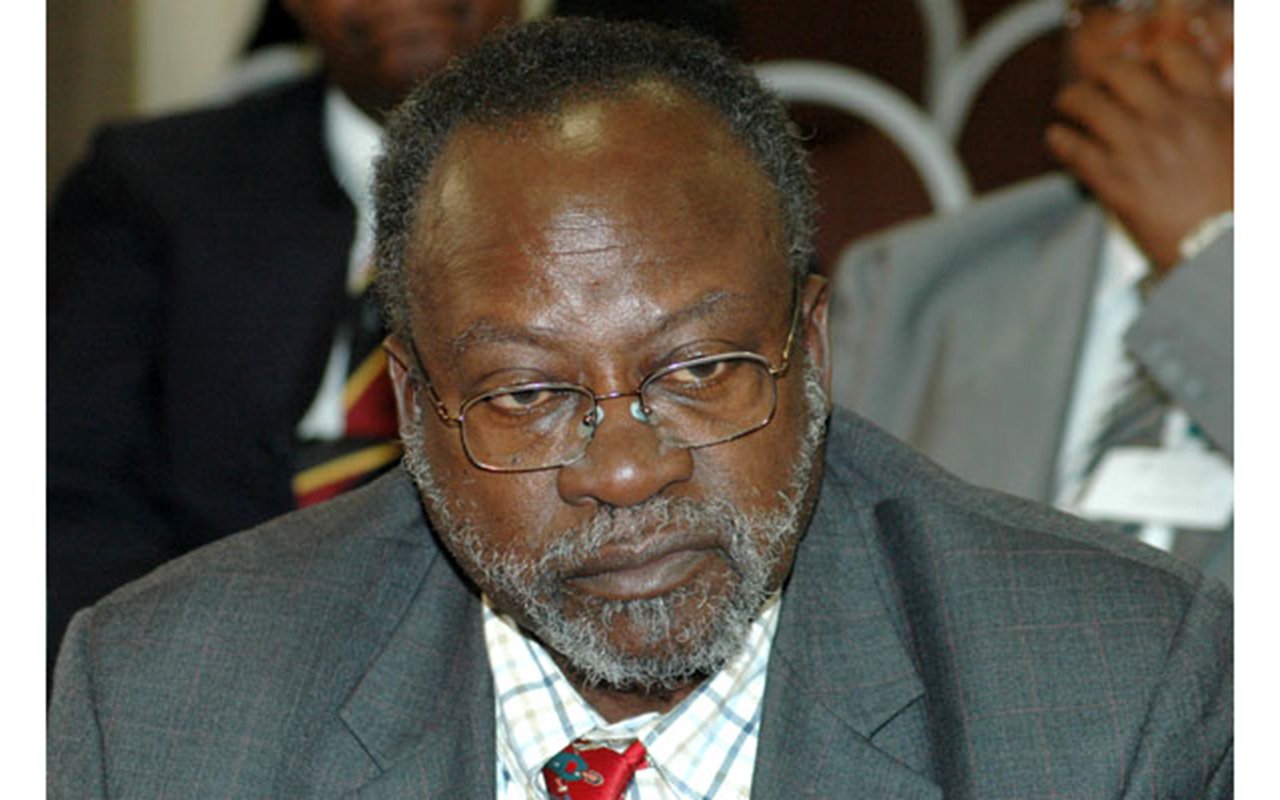
Prof Tarsis Kabwegyere, the former director for External Affairs at the NRM Secretariat. PHOTOS/ FILE
Twenty nine years ago early this month, two leading ideologues of the ruling National Resistance Movement (NRM), Mr Jotham Tumwesigye and Prof Tarsis Kabwegyere, issued separate statements in which they warned of tough action against those who were convening political rallies under the guise of carrying out consultative meetings on the goings on in the Constituent Assembly (CA).
Mr Tumwesigye was at the time serving as the Deputy National Political Commissar (DNPC) and director for Legal Affairs at the NRM Secretariat.
Prof Kabwegyere was at the time serving as the director for External Affairs at the NRM Secretariat.
The warning followed the convening by leading proponents of both multiparty democracy and federalism two meetings in Natete and Katwe in Kampala.
Among those who addressed the two rallies were John Ken Lukyamuzi, alias The Man, who was the secretary general of the Conservative Party (CP); Makindye West CA delegate Nsubuga Nsambu and Rubaga North CA delegate Wasswa Lule.
Mr Lule was to later represent Rubaga North in the 6th Parliament, while Mr Lukyamuzi represented Rubaga South in the same Parliament.
Nsambu, who was to later represent Makindye West in the 6th and 7th Parliaments, passed on in September 2016.
The pro-federo and pro-multiparty activists called the rallies after they lost on June 20, 1995, a vote in the CA against the enshrinement of the Movement political system in the 1995 Constitution.
The group, working under what was known as the National Caucus for Democracy, which had Prof Dani Wadada Nabudere as secretary general, was also opposed to proposals to use periodic referenda as a means through which political systems could be changed.
According to the Wednesday Monitor edition of June 21, 1995, the vote was taken at 7.30pm after eight hours of nonstop debate, the climax of four days of debate. The loss precipitated a walkout.
Buganda’s quest for Federo had also suffered defeat in a much earlier debate held on March 28, 1995.
Threats
During the two rallies at which other leading proponents of both multipartyism and federalism addressed the gatherings, Mr Lule threatened to engage in activities that would eventually torpedo the Constitution making process.
For that, he and Nsambu were summoned to police headquarters to record statements. Mr Bob Ngobi, then public relations officer of the Uganda Police Force, explained why the duo had been asked to record statements.
“The police wanted them to clarify on statements they’d made about not condemning Intongwa and torpedoing the Constitution,” Ngobi said.
Mr Ngobi added that police would inform the public if it chose to take any further action against the two CA delegates.
Maj Herbert Itongwa, a veteran of the National Resistance Movement/Army (NRM/A) Bush War, fell out with the government amid accusations of theft and indiscipline. He later declare war on the NRM government in 1994, but later fled into exile in Germany after his rebellion had been crushed. He died in exile.

Former Deputy National Political Commissar and director for Legal Affairs at the NRM Secretariat, Jotham Tumwesigye.
The warnings
In response to those developments, both Prof Kabwegyere and Mr Tumwesigye warned the Opposition against underestimating the NRM’s ability to deal with political actors who, according to the two men, “take the law into their own hands”.
“We have been busy with other things but we shall act in a way that is appropriate,” Mr Tumwesigye told this newspaper back then.
Mr Tumwesigye, who was to later serve as the Inspector General of Government (IGG), said whereas there was nothing inherently wrong with CA delegates convening consultative meetings in the constituencies that they were representing, it was important that they guarded against turning those meetings into political rallies.
Mr Tumwesigye was, however, quick to say the rally in Natete was not a multiparty activity because Mr Jaberi Bidandi Ssali, who was the minister for Local Government and delegate representing Nakawa, had been invited and addressed the gathering.
Speaking in a separate interview, Prof Kabwegyere said the authorities would have to take a stand if the proponents of multiparty politics and federalism violated the law.
“If multipartyists abuse the freedom, some authority will say no,” he said. “There’s no big deal at these rallies and their organisers are being watched to ensure they are doing the right thing.”
The Monitor of Wednesday, July 5-7, 1995, quoted Prof Kabwegyere saying NRM would have banned political parties much earlier on, or outlawed them during the making of the Constitution, but added that “a precipitant state which acts rashly is dangerous. We’re trying to avoid that.”
It should, however, be remembered that whereas the NRM never banned political parties, legal notice number 1 of 1986 suspended “all forms of political activities” until further notice. The same instrument directed that all forms of gatherings had to be cleared by the police.
The June 20, 1995, vote in the CA also constitutionalised the suspension of political party activities. Article 269 barred parties from engaging in “any activities that may interfere with the movement political system” was written into the 1995 Constitution.
The same Article barred them from operating branches, holding public rallies and sponsoring candidates for political office for as long as the Movement system was in force.
No sense of history
The newspaper further quoted the professor saying the multipartyists lacked a sense of history and would be judged accordingly.
“A genuine consultative meeting is legal, but the problem comes with what the politicians say at the rallies and if it is in bad taste, government organs take up the matter,” he said.
Asked to explain why police had previously stopped mere seminars organised by, among others, Michael Kaggwa, Lukyamuzi, and consultative meetings organised by CA delegate for Lira Municipality Cecilia Atim Ogwal, Kabwegyere said Lukyamuzi and Kaggwa were not CA delegates and, therefore, had no excuse to call rallies.
Defying Obote
Ogwal, who was the deputy secretary general of the Opposition Uganda Peoples Congress (UPC), had defied party president Milton Obote, who had directed UPC members not to participate in the elections organised by the NRM on grounds that it would legitimise a military junta.
That partially explains why Ogwal later left UPC and joined the Forum for Democratic Change (FDC). Ogwal, who later switched political constituencies from Lira Municipality to Dokolo where she became the Woman District Representative, passed on in January this year.
On Ogwal, Kabwegyere said she had run herself into trouble with the authorities by inviting all UPC supporters from all over Lango sub-region to attend her activity, which implied that it was not a consultative meeting, but a UPC rally.
“It is acceptable to call any number of delegates to your area as long as you inform the police. This does not reflect any weakness in the CA statute,” Prof Kabwegyere said.
The same newspaper quoted Mr Ngobi, saying police had no intentions of disrupting any consultative meetings called by CA delegates as long as the CA process was ongoing and as long as what was up for discussion were constitution related issues.
“The police will, however, not hesitate to prohibit such meetings taking place if they are likely to cause a breach of the peace,” he warned.
